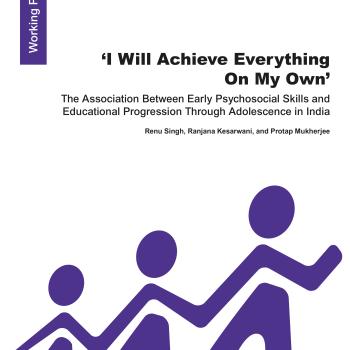Publication Information

Psychosocial skills are an important element of the confidence and motivation to progress in academic life. This working paper utilises a factorial logistics model to highlight the association between psychosocial skills at age 12 and educational progression through adolescence (to age 19), analysing Young Lives quantitative survey data of Older Cohort children and longitudinal qualitative data collected between 2007 and 2014 in undivided Andhra Pradesh, India.
Quantitative data analysis shows that psychosocial skills such as subjective well-being and self-efficacy at 12 years old are significantly positively associated with retention in education at 19 years old. These findings are supported by qualitative data. Findings reveal that household wealth, children’s paid work at age 12, as well as caregivers’ education and occupational aspirations for their children play a significant role in shaping the self-efficacy and subjective well-being of children. Gender, birth order and caste also play a significant role in framing the association between psychosocial skills at 12 years old and educational outcomes at 19 years old. Given these findings, it would be useful for programme interventions aiming to retain children throughout secondary schooling to focus on building parental aspirations, particularly for girls and socially and economically disadvantaged households. Other areas that require policy attention are around providing social protection to disadvantaged households and developing teachers’ skills in order to encourage and build the psychosocial competencies of children.

Psychosocial skills are an important element of the confidence and motivation to progress in academic life. This working paper utilises a factorial logistics model to highlight the association between psychosocial skills at age 12 and educational progression through adolescence (to age 19), analysing Young Lives quantitative survey data of Older Cohort children and longitudinal qualitative data collected between 2007 and 2014 in undivided Andhra Pradesh, India.
Quantitative data analysis shows that psychosocial skills such as subjective well-being and self-efficacy at 12 years old are significantly positively associated with retention in education at 19 years old. These findings are supported by qualitative data. Findings reveal that household wealth, children’s paid work at age 12, as well as caregivers’ education and occupational aspirations for their children play a significant role in shaping the self-efficacy and subjective well-being of children. Gender, birth order and caste also play a significant role in framing the association between psychosocial skills at 12 years old and educational outcomes at 19 years old. Given these findings, it would be useful for programme interventions aiming to retain children throughout secondary schooling to focus on building parental aspirations, particularly for girls and socially and economically disadvantaged households. Other areas that require policy attention are around providing social protection to disadvantaged households and developing teachers’ skills in order to encourage and build the psychosocial competencies of children.

